After
Venice, Florence was a culture shock, or maybe it’s an
anti culture shock. After checking into
our hotel across from the train station, we realized the Galleria dell’ Accademia,
home to Michelangelo’s world famous statue of David was open for another few
hours. So we set out on the fifteen
minute walk to the gallery, paid our twelve euros each at the door, and headed
inside to see the giant sculpture looming above the hoard of tourists. That’s when David and I noticed the only
language being spoke was American English.
There in the middle of Italy we were surrounded by other Americans. This would set the tone of our time in
Florence.
 |
Trying to get twelve euros worth of enjoyment out of starring at David in Florence.
|
Getting back to the statue of David and the Galleria dell’
Accademia. Aside from the monolithic
statue of David the gallery is home to several unfinished statues of Michelangelo. After being commissioned to crave out
sculptures of men for the Pope’s tomb and beginning his work, the Pope died and
the contract for the sculptures was cancelled.
So Michelangelo stopped working on them.
I was very much looking forwards to seeing these unfinished works as
they offer a rare glimpse for non-artists to see the stages of carving.
 |
| One of the statues commissioned to Michelangelo and never completed down the hall from the complete David statue. |
After exploring the stone sculptures of Michelangelo I
decided to check out the other art housed in the gallery. I wasn’t sure what other pieces were kept in
the gallery, but I was determined to find out.
Then I was disappointed to find it was mostly plaster casts of
sculptures (boooo!) or gothic paintings about Saint Francis (double
booo!). Gothic art is too dark and
unrealistic for me to enjoy. All of the
people in the pieces don’t look quite right (with a lazy eye or lopsided face),
like artists couldn’t quite figure out what a human being looks like until the
Renaissance. So I went back and sat on one of the benches in front of Michelangelo and listened to an American tell another American about academic
debates among David scholars. I think he
was trying to sound sophisticated, but to me he just sounded dull. The plaque explaining these debates was in
large font adjacent to the statue, where no doubted he read about them moments
earlier.
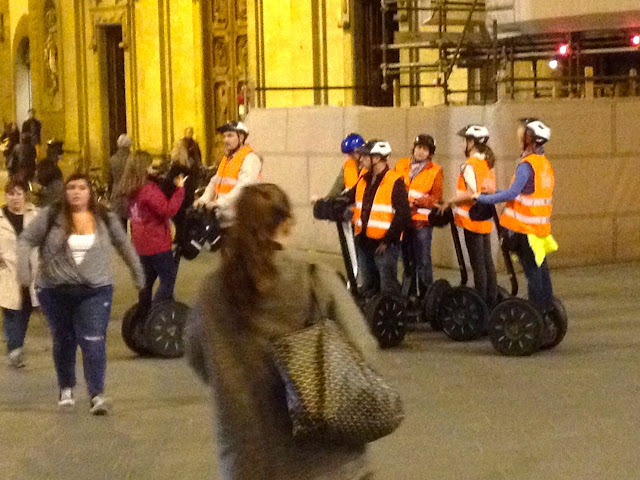 |
| Is this Florence? It looks like the USA to me. |
We left the gallery well before it closed and began to
wander around Florence. Florence is easy
to traverse on foot, with large roads, open squares, and a sparse amount of
cars. The streets were flooded with
Americans and I was for the first time in
Italy able to understand most of the
conversations I heard as we passed. My
heart sank a little at the plethora of gift shops selling graphic tees. It was a far cry form the artisanal shops
selling Murano Glass and hand-made masquerade masks of
Venice. We kept walking though and eventually found a
monument that lifted my spirits.
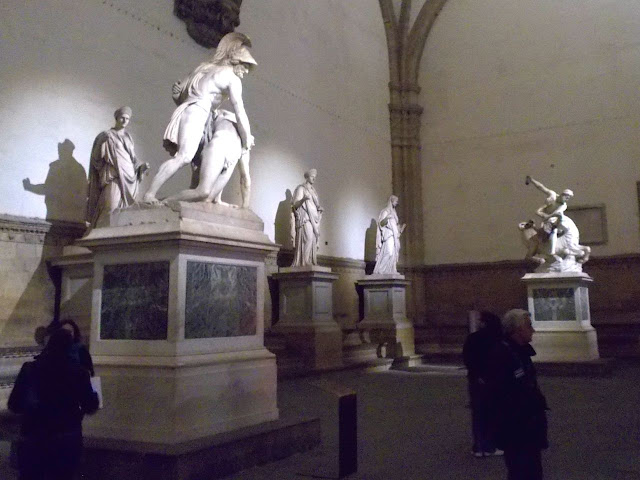 |
| A monument of Renaissance and Baroque statues adjacent tot he Vecchio Palace. |
In a large square, adjacent to the Vecchio Palace, was a monument
of sculptures. So many of the plaster
casts I had seen in the gallery were in this alcove of sculptures in the flesh
(or stone so to speak). It was twilight
and standing amongst the works of art with characters twice my height, and only
a handful of other people to share the space with, I felt I had found the Florence I had been looking for. I was able to
smile instead of sneer at the Segway tour we passed on our way back to the
hotel.
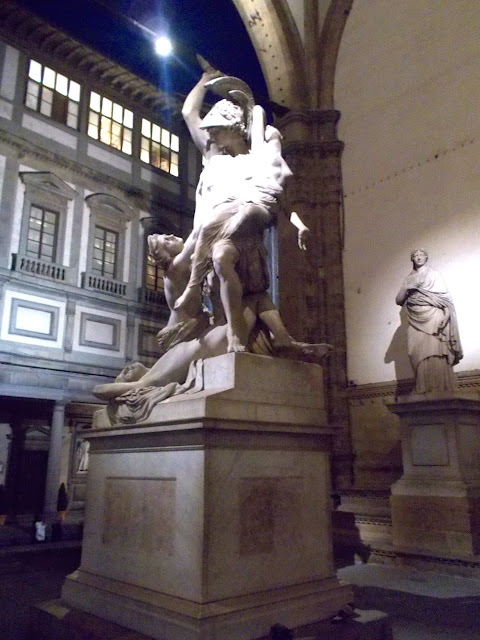 |
| The complexities drawn out of the stone in impressive. |
The next day wanting to get away from the throng of
Florence, we decided to take a train to Piza.
The trip to Piza by train takes about an hour and costs eight euro. It’s a commuter train that makes several
stops, making the journey longer than it would be otherwise. There are a variety of options to get to Piza
including guided tours on a bus. We
chose the train since we were looking for peace and quiet among the locals, not
being crammed onto a bus with a bunch of other Americans. Indeed the dominant language of the train was
subdued Italian.
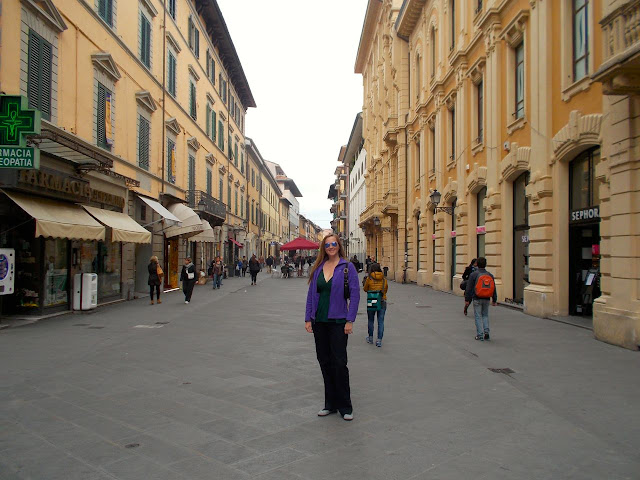 |
| The quiet streets of Piza are treat after overrun Florence. |
The main negative most would see in taking the train to Piza
is the distance to the leaning tower and other monuments, about a mile walk. The streets of this town were quiet and quaint,
and I thoroughly enjoyed the walk despite my feet protesting from days of long
walks on stone streets.
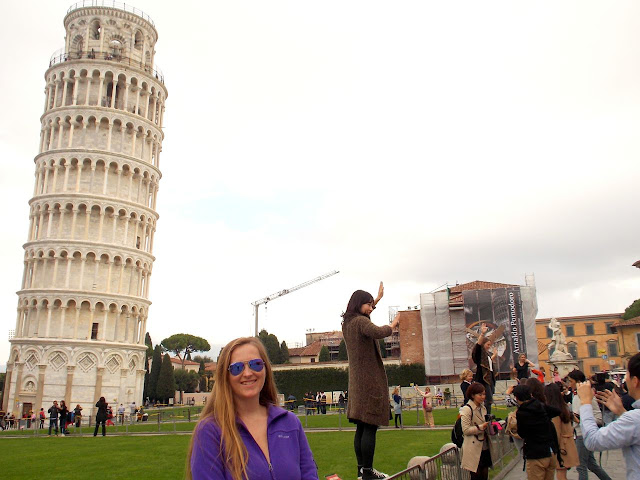 |
| I enjoyed watching the dozens of tourists trying to get a photo of holding up the tower almost as much as the tower itself. |
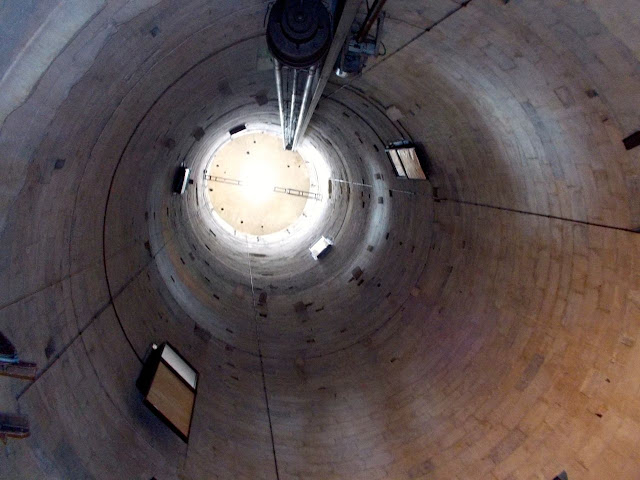 |
| Looking up the inside of the tower of Piza. |
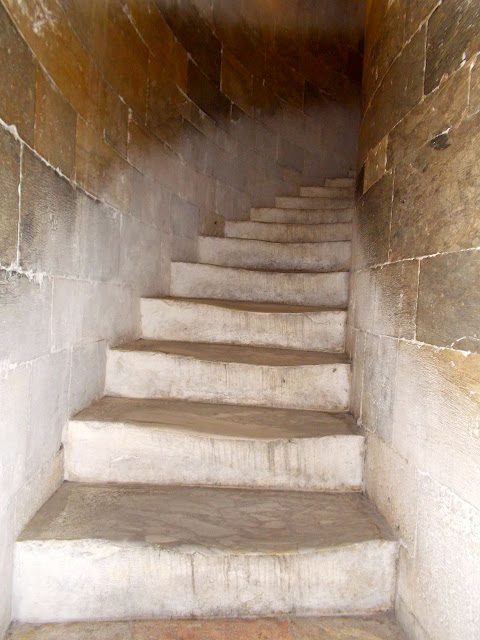 |
| Stairs used to ascend the tower of Piza are most worn in the spot easiest to walk up based on the lean. The worn areas move from side to side as they wind from the ground facing side to the sky facing side. |
Eventually we found the plaza where the leaning tower is
located. Definitely the most touristy
area of Piza. This plaza contains not just the tower, but also a cathedral,
baptistery, and a couple other smaller monuments. Having seen so many churches already, our goal was the leaning tower, also the most expensive of the monuments at
eighteen euro.
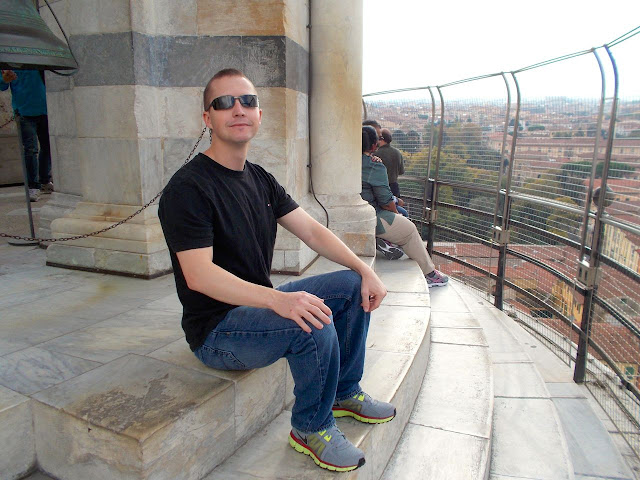 |
| David enjoys a seat on the stairs encircling the bells of the tower summit after the walk up. |
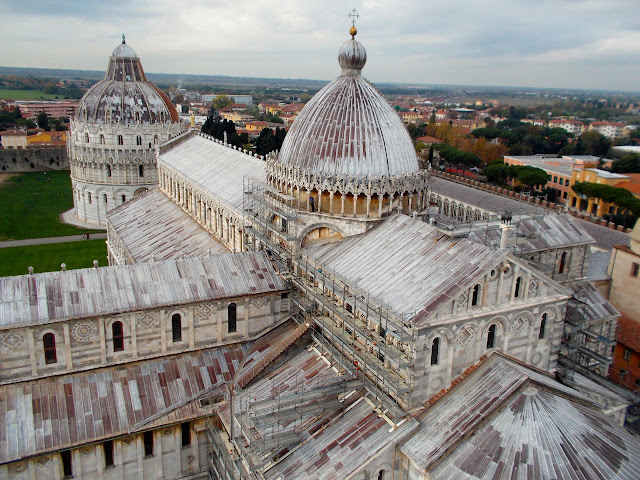 |
| The large cathedral and baptistry as seen from the tower summit. Baptistries exist, because for a period only baptized christians could enter cathedrals. |
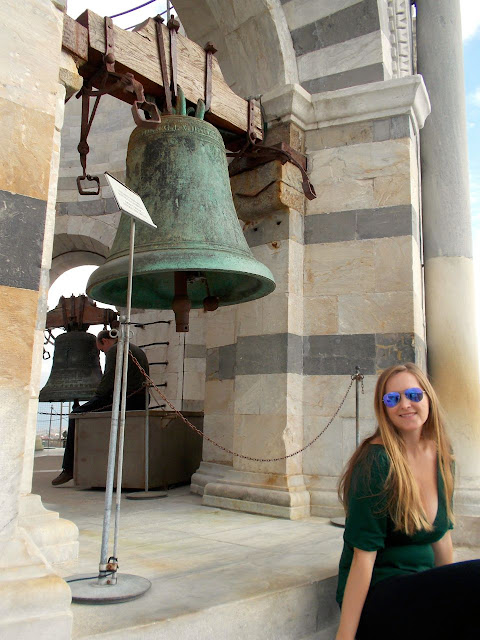 |
| My turn for a break next to the tower bells. |
To keep the volume of people in the tower down to a
reasonable number, each ticket has an entry time that visitors must wait for
before entering the tower. We only had
to wait fifteen minutes. It was just
enough time to stash my purse in the locker provided for free with the tower
ticket (no bags of any size are allowed in the tower) and head across the grass
to get the obligatory photos with the tower out of the way. I’m not sure what was more entertaining, the
tower or watching all of the other tourists standing on columns posing as if
they were holding the tower up.
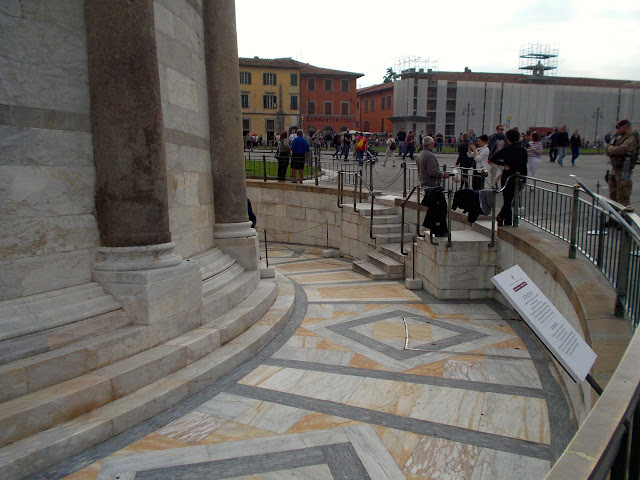 |
| The addition of a lowered plaza encircling the tower is partially attributed to the tower's leaning nature. |
When our time came to ascend the tower, we went through a
security screening consisting of waving a metal-detecting wand over us and
headed inside. The interior of the tower
is not much to sing about, somewhat resembling the interior of a toilet paper
roll. The staircase winds up and around,
wedged in between the outermost and interior walls. The stairs are worn and slumped at one point
in particular on each step where climbing is easiest, towards the interior on
the skyward side of the tower and towards the outside on the downwards side of
the tower. Ascending the tower felt
somewhat like I was in a fun house meant to mess with my senses and send me off
kilter.
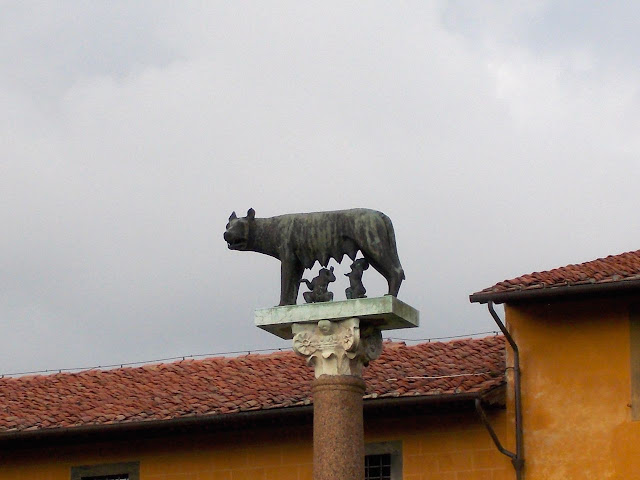 |
| Romulus and Remus, the founders of Rome, drink from the teats of their adopted wolf mother. This image is common in Rome and its surrounding areas. Romans believed the milk of the wolf gave them power. |
The awkward hike was worth it, to reach the zenith,
where a ring of bells is encircled by a few stairs perfect for lounging on
while catching my breath and taking in the scenery. We spent a lot of time up there just admiring
the view. There was a nice breeze to
counteract the surprising heat of November.
I checked out the cathedral from above that we were going to enter next. Eventually I picked my way back down the
fun-house like stairs to the exit.
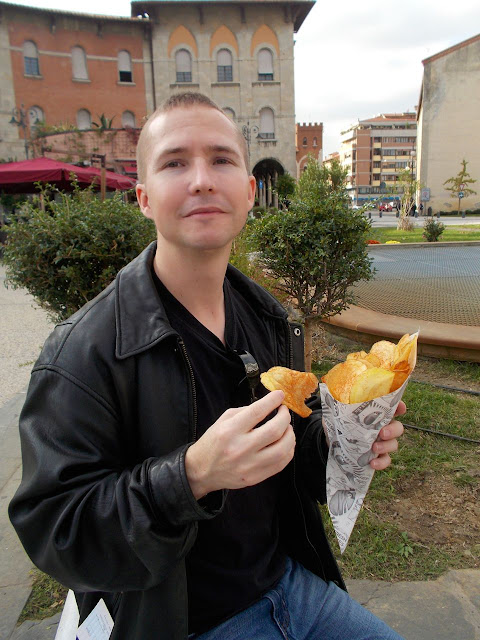 |
| David holds our cone of freshly fried chips for lunch in Piza. |
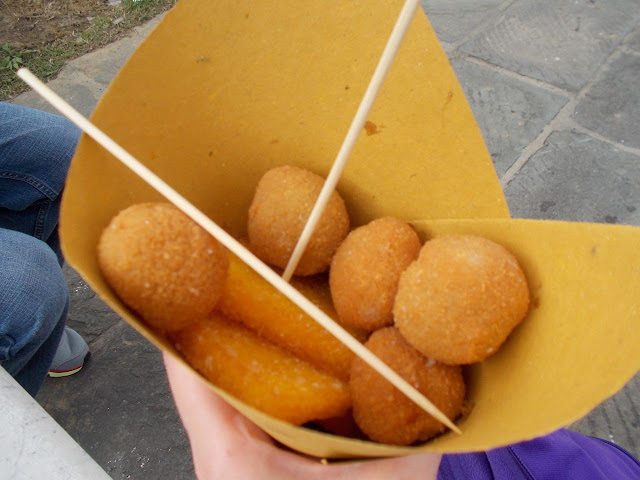 |
| I balance a cone of deep fried polenta and olives for our shared lunch at the Piza market. |
We headed around the cathedral to find out it was closed for
the next hour and a half. So instead we
went in search of lunch, which we found a few blocks away from the train
station at an outdoor market. With the
broken English of the vendors and my severely broken Italian (I only know what
overlaps with Spanish) we purchased two beers, a cone of freshly fried chips
with spicy seasoning, and a cone filled with dried olive and polenta. We sat down on a bench and had one of the
most relaxing moments of our time in
Italy, even though I soon found out I
couldn’t eat the olives because they were stuffed with meat.
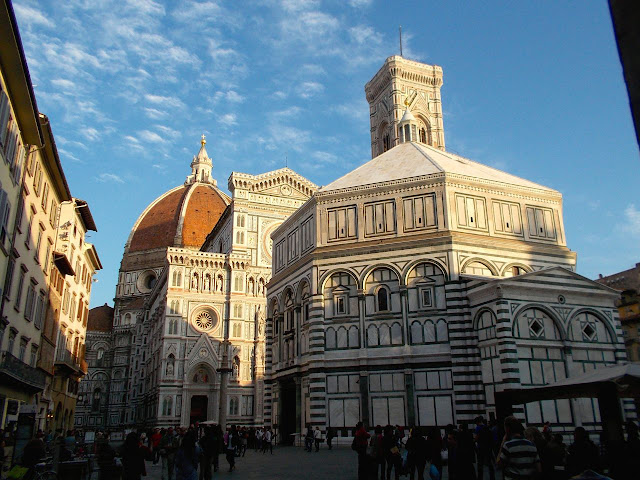 |
| The baptistry in the foreground and cathedral in the background of Florence are the size of a sports stadium and colorful to boot. |
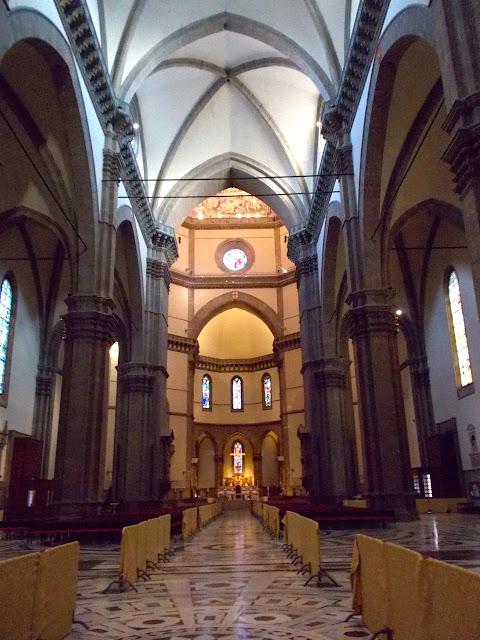 |
| The inside of the cathedral is not so intricately decorated, although still massive. |
 |
| I enjoy an up close look at the decorative exterior of the cathedral. |
After lunch we jumped on a train back to Florence and put
our feet up. We would need the break
since we had a lot of walking planned on our evening itinerary. While Florence is filled with museums, I
wanted to explore its culinary side that led me to two different types of Italian
food I had not yet experienced, gelato and cicchetti.
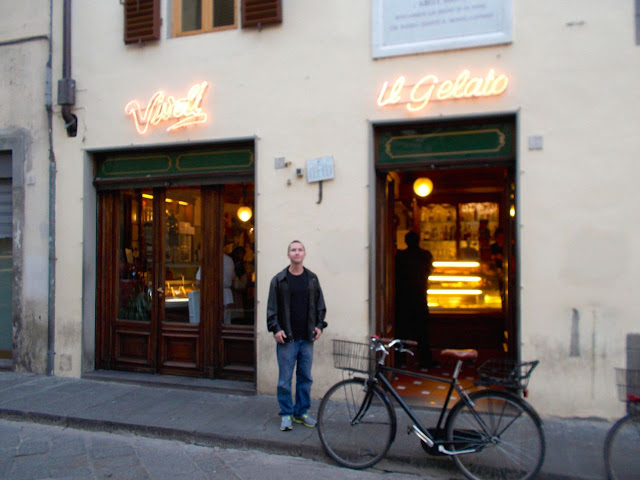 |
| David is relieved we actually found the gelato restaurant we were looking for. Time for some homemade gelato! |
Gelato some may think of as Italian ice cream. The main difference between gelato and other
ice creams, is that it is slow churned which captures less air in the mixture,
resulting in a denser and creamier texture.
All over Florence there are gelato stands with neon-colored fake
flavored gelato. I wanted the real thing,
with real ingredients, made in store. After
some online and travel documentary style research I found Vivoli where gelato
is made fresh every day from scratch. I
had been waiting to go to this gelato shop since weeks before my plane left for
Italy, and I was not disappointed. I got
the crema flavor, made only of cream, eggs, and sugar. It was delicious. The lack of other tart or sweet ingredients
really let me taste the difference between gelato and ice cream. It tasted like custard pie, but milder and
with an altogether different texture. David
got the tiramisu flavor, which he seemed to enjoy as well.
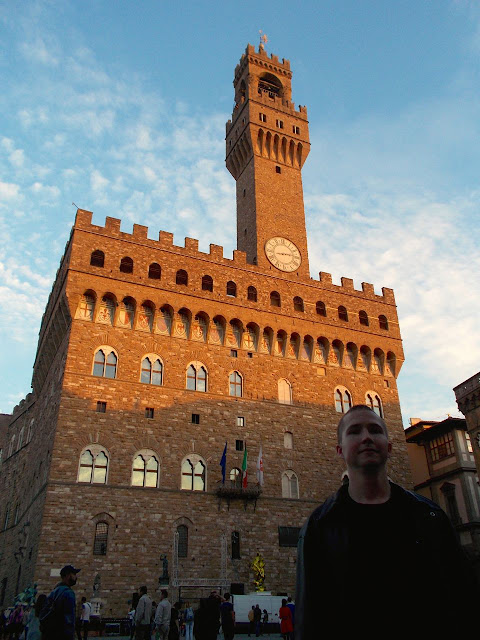 |
| David is dwarfed by the Vecchio Palace of Florence. It was closed while we were in town. |
After gelato we headed on to our next culinary stop
cicchetti. Cicchetti is akin to tapas in
Spain. That is, when you order a glass
of wine or beer, a snack comes along for the ride to your corner of the
bar. I love wine, and I wanted something
local to the region. A cicchetti wine
bar was jus what I needed, local wine was all they had. A little hole in the wall with only about ten
seats the bartender let us taste a few wine from mini wine glasses before
deciding which we wanted. I started with
a white before moving on to a red, and each course of wine came with a platter
of bread and cheese, plus meat on the second platter for David. Sitting on that stool slowly sipping wine so
near the magnificent monument of statues and Vecchio Palace, with several
Italians blocking my way to the narrow exist surrounded by tourists shops I
felt as if I was on an island oasis away from my fellow Americans.
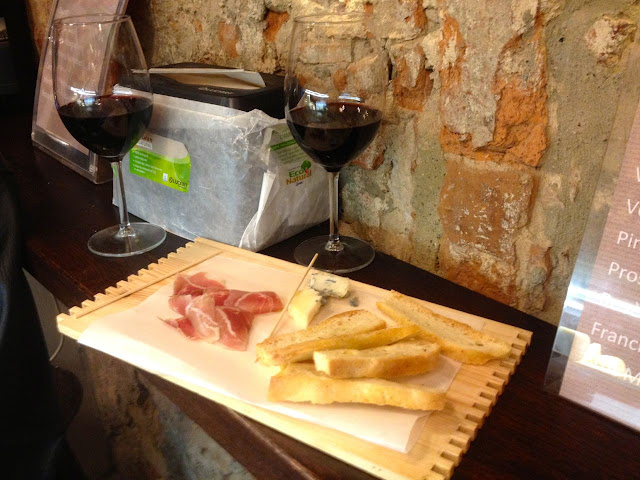 |
| Yummy cicchetti to go with our wine in a Florence wine bar. |
Don’t get me wrong I am actually happy that I saw so many
Americans in Florence. The more we
travel abroad as individuals the better we will become as a country at
international diplomacy. I just wanted
Florence all to myself, and after my initial shock I found some ways to make
that happen, the last of which was by drinking an Italian beer while sitting on
the ledge of a bridge spanning the river which separates touristy Florence from
local’s Florence.
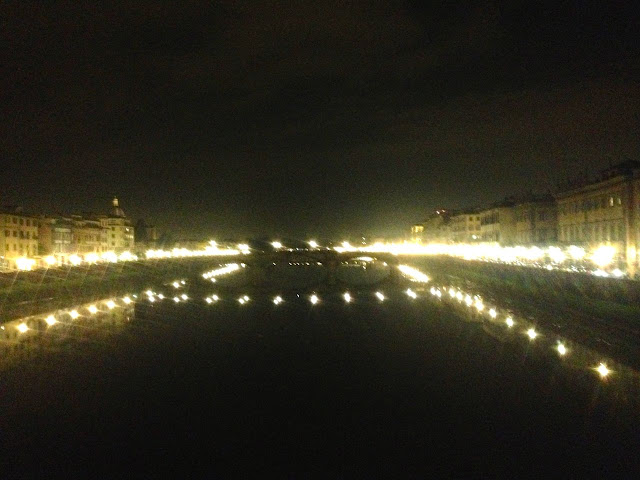 |
| Our view of the river as we enjoyed our beers, our last night in Florence. |























No comments:
Post a Comment